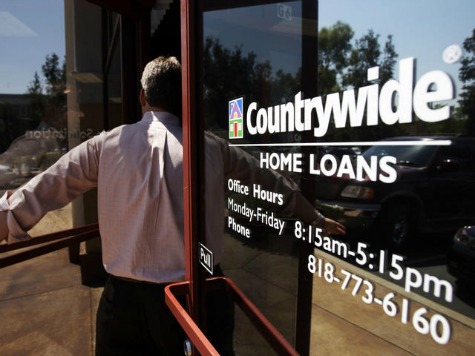
Over the holidays, while the American people were busy celebrating Christmas and New Year, the House Ethics Committee quietly swept a major political scandal under the rug.
You may recall the Countrywide Financial influence-peddling scandal, where at least a dozen members of Congress (and many other key Washington figures) received preferential loan treatment as part of a company VIP program named “Friends of Angelo” for the company’s disgraced former CEO, Angelo Mozillo. On December 27, the House Ethics Committee decided that this scandal is simply “outside its jurisdiction” and took no action. Case closed.
The Hill‘s Peter Schroeder explains:
The House Ethics Committee has decided to close its investigation into preferential mortgages doled out under a controversial VIP program without taking any action.
The panel said it was not taking any action on members who received more affordable mortgages under the program, instituted by the now-defunct Countrywide Financial because while allegations surrounding the program and lawmakers involved “serious matters,” they largely fell outside its jurisdiction.
For example, many of the allegations pertain to actions outside the Ethics Committee’s statute of limitations — greater than three Congresses ago — and many of those accused are no longer working in Congress either as members or staffers.
So, in other words, it took Congress so long to act on this scandal that now many of the transgressors are retired or were bounced from Congress. And whose fault is that?! The Senate Ethics Committee began review of this scandal in 2009 and wasted no time in whitewashing the whole mess. It took the House Ethics Committee four years to “investigate” and then do nothing.
The issue of timing aside, the House Ethics Committee stated that it could find no evidence that the majority of the members were aware of the VIP treatment. But this is nearly impossible to believe.
According to a stinging report released by the House Government Reform and Oversight Committee in July 2012, at least a dozen members of Congress received home loan rates not available to the general public. And they almost certainly knew they were getting a sweetheart deal. In fact, correspondence uncovered by the House Oversight Committee has the words “VIP TEAM” emblazoned at the top of the letter!
And then there’s the sworn testimony involving a Countrywide loan granted to former Senator Chris Dodd (D-CT).
Dodd, who just happened to be chairman of the powerful House Senate Banking committee, used two “VIP” mortgage loans in 2003 to refinance residences in Connecticut and Washington, DC. And an official who worked in the Countrywide program testified before Congress that Dodd absolutely knew he was receiving special VIP treatment. Dodd was so impressed with the VIP program he even recommended it to a staffer for a Senate colleague who got her fees waived too.
So here’s the key question: We know how Congress benefited from this program, but what did Countrywide get in return for its largess?
At the same time Countrywide was doling out sweetheart mortgage deals, their lobbyists were pressuring Congress on a wide range of issues pertaining to the mortgage lending industry.
For example, according to the House Oversight Committee report, “on June 17, 2008, the same day he acknowledged for the first time that he was a Countrywide VIP customer, Dodd announced that he was bringing to the Senate floor a housing bailout to help Countrywide and other struggling subprime lenders.”
And as Politico noted when the House Oversight Committee report was issued, the “Friends of Angelo” program was far more damaging than a waste of taxpayer funds in the form of a quid pro quo mortgage industry bailout. The program also helped to kick off the entire financial crisis by playing a “critical part” in blocking efforts to reform the mortgage lending industry, including the government sponsored enterprises (GSEs) Fannie Mae and Freddie Mac. Countrywide also gave sweetheart deals to top officials at those GSEs, who were the biggest buyers of Countrywide’s dubious mortgage loan products.
We cover this in some detail in our New York Times bestselling book, Corruption Chronicles. (Have you purchased your copy yet? If not, please click here. And be sure to check out the best-selling book by author Ben Shapiro “Bullies.”):
Fannie and Freddie (and federal housing policy, generally) helped create the mortgage backed securities and secondary mortgage markets that collapsed in 2008 because of the loss of confidence in the subprime mortgage market – which was also pushed along by the federal government. Fannie even had a mortgage program it ran with Countrywide called “Fast and Easy.” That’s not the name of a pawnshop, but a government-backed mortgage program!
The point is that there is a direct relationship between the Countrywide “Friends of Angelo” program and the collapse of the housing market. As I’ve been saying now for four years, corruption, as much as bad policy, was to blame for the financial crisis.
So yes, as the House Ethics Committee acknowledged, the corrupt Countrywide influence peddling scandal was a “serious matter.” And it merited serious investigation.
Instead, the House Ethics Committee delayed and then used the excuse of the delay to drop the case. You can read the Committee’s dishonest report here. Washington’s traditional government institutions to enforce the rule of law with politicians and government officials are fundamentally broken.

COMMENTS
Please let us know if you're having issues with commenting.